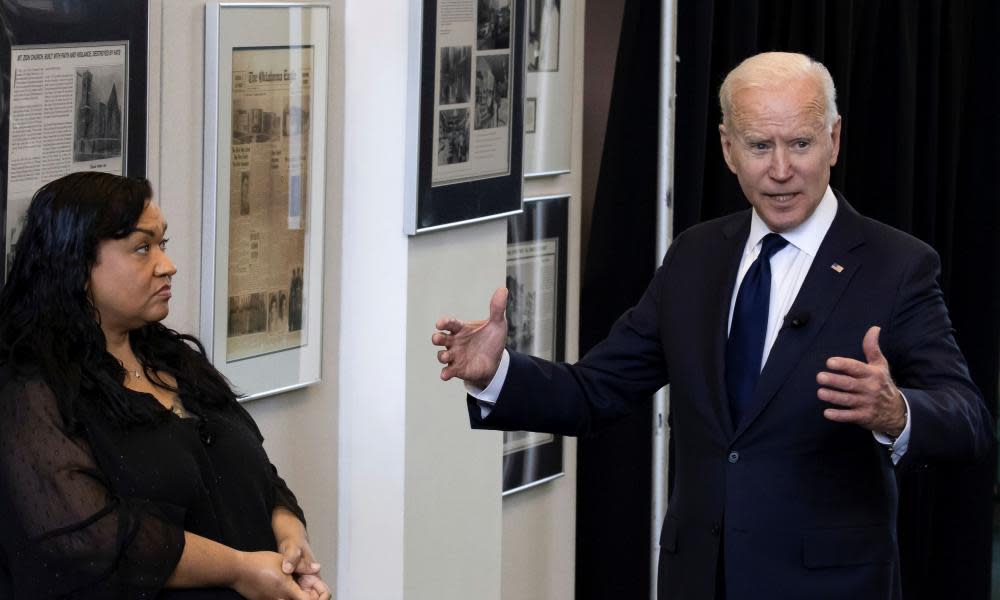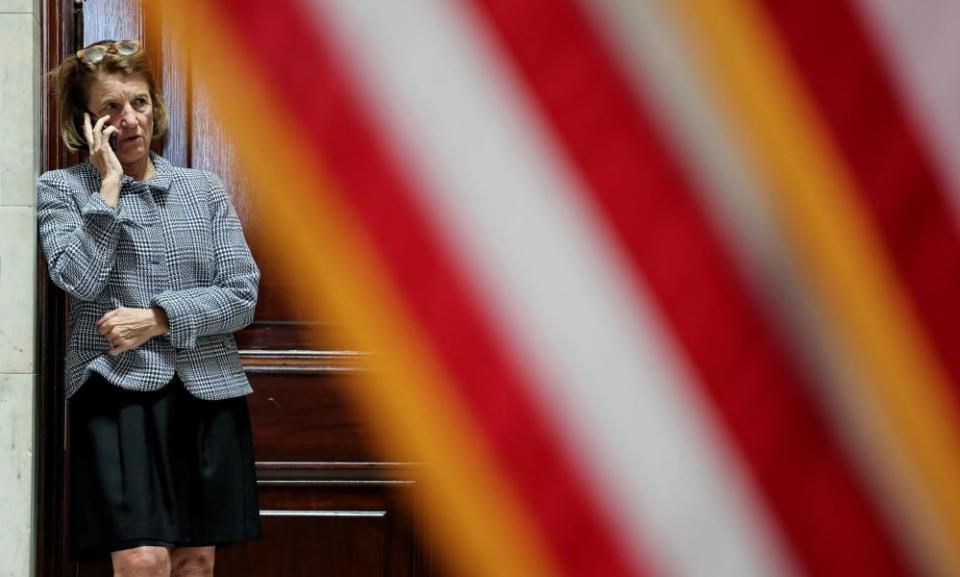Biden’s push for racial justice at stake in bipartisan infrastructure talks

- Oops!Something went wrong.Please try again later.
The massacre of innocents was just the beginning, Joe Biden explained. African Americans in Tulsa, Oklahoma, would go on to be locked out of home ownerships, see a motorway built through their community and endure chronic underinvestment by government.
“This story isn’t about the loss of life, but a loss of living, of wealth and prosperity and possibilities that still reverberates today,” the US president said during a visit marking the centenary of an attack by a white mob that left up to 300 people dead.
Related: Biden proposes $6tn budget to boost infrastructure, education and climate
He went on to offer hope, announcing expanded efforts to narrow the racial wealth gap that has proved generational in Tulsa and countless other cities. But a day later, Biden found himself back in Washington, haggling behind closed doors over a legislative proposal that could make or break his promise to right this systemic wrong.
When it was unveiled in March, the $2.3tn American Jobs Plan made good on Biden’s campaign pledge by proposing to advance racial equity in education, employment, healthcare, housing and transport. It included $400bn to create jobs and boost wages for millions of women of colour who work as caregivers for the elderly and disabled.
But that is precisely the type of provision that Republicans oppose, arguing for a traditional definition of infrastructure as airports, bridges, railways and roads along with broadband internet.
During negotiations they have already forced Biden to trim his proposal to $1.7tn. There are fears that, if past form is any guide, Republicans will continue to chip away at the very measures that benefit the most marginalised.
Yvette Simpson, chief executive of the progressive group Democracy for America, said: “We thought that the American Jobs Plan was already a compromise position and you have Republicans pulling out even more of it.
“When you think about who has been the hardest hit by the pandemic, who is always hit the hardest in this country, it’s Black and brown people. So if Republicans start to gut parts of this bill, the folks who are going to be most affected are the folks who need it the most, which happen to be Black and brown people.”
The Republican view of infrastructure is too narrow, Simpson added. “I always say Republicans love potholes more than people. They love bridges more than they love Black lives. They care more about wealthy than working families.
“Give them everything that they want and they’re not going to come back and support you, so then you’re not going to be able to pass the bigger things that we need to fill the gap as it relates to Black and brown people in this country. We’re talking about the care economy, human infrastructure – things that have to stay in this bill and have to stay robust in this bill.”

The typical white family in the US has eight times the wealth of the typical Black family and five times the wealth of the typical Hispanic family, according to research by the Federal Reserve.
In his Tulsa address, as he urged America to confront disquieting truths about itself, Biden noted that the percentage of Black homeownership is lower today than when the Fair Housing Act was passed more than half a century ago.
The president also used the occasion to tout the American Jobs Plan, which includes a $10bn fund to support community-led civic infrastructure projects that create innovative shared amenities; $15bn for new grants and technical assistance to overhaul existing transportation; a tax credit to attract private investment in affordable homes; and $31bn to increase access to capital and provide technical assistance to disadvantaged small businesses.
Senate Republicans, however, are intent on a narrower definition of infrastructure and propose to spend a more modest $928bn over eight years. Biden has reportedly dismissed the counteroffer as unworkable, partly because it would be paid for by dipping into unused coronavirus relief funds; he would prefer to raise the corporate tax rate to generate revenue for his $1.7tn target.
Related: Joe Biden calls for US to confront its past on 100th anniversary of Tulsa massacre
The White House set a deadline of 7 June to see clear signs of progress in reaching an agreement. On Wednesday the president, who has been described as an apostle of bipartisanship, spent nearly an hour in a private meeting with Shelley Moore Capito, Senate Republicans’ lead negotiator on infrastructure, trying to thrash out a deal.
Capito has made her position clear. “We disagree on the definition of infrastructure and we’ve been working with the president to bring it back to the physical core idea of infrastructure that we’ve worked so well on in the past,” she told Fox News last Sunday. “Whether that’s roads and bridges, waterways, ports, lead pipes, transit, airports, and also the new infrastructure, which we must have everywhere – broadband. Those are great categories, I think, that we can work together on.
“I think it is so easy to say, ‘Let’s throw everything in’, and I think that’s what the president did initially. Human infrastructure, social infrastructure, great things to talk about, things that we need to address – daycare, senior care, all those items. But, that’s not what we consider physical infrastructure or modernising our transportation system to meet the next century challenges, and that’s where I think we need to concentrate our effort at this point.”
You don’t have people to work on roads, bridges and railways if people don’t have childcare or if people are not healthy
Amara Enyia
Improvements to physical infrastructure that upgrade inner-city schools, replace lead pipes or reduce air pollution in Black and Latino neighbourhoods near ports and power plants would make a welcome difference.
But Amara Enyia, policy and research coordinator for the Movement for Black Lives advocacy coalition, contends that Capito and other Republicans’ framing will no longer suffice.
“It doesn’t really make sense to hold on to that narrow definition, which just speaks to the fact that they’re unwilling to actually grapple with the challenges that this country is facing in this moment,” she said. “You don’t have people to work on roads, bridges and railways if people don’t have childcare or if people are not healthy.
“What we’re seeing is trying to be creative and expanding the definition because we are living in unprecedented times where the challenges that we’re facing are not going to be addressed with interventions from the past or with solutions that may have worked 10 years ago, 20 years ago, 30 years ago.”
Capito represents West Virginia, a state where Donald Trump beat Biden in a landslide and where the population is 93.5% white, 3.6% African American. West Virginia’s other senator, Joe Manchin, is a conservative Democrat who could prove decisive if the party tries to pass the American Jobs Plan without Republican support through a congressional process known as budget reconciliation, requiring a 51-vote threshold in the Senate.

Some campaigners believe there is no alternative since Republicans’ refusal to even hold a commission on the 6 January Capitol insurrection shows they cannot be trusted. Maurice Mitchell, national director of the Working Families party (WFP), said: “That Republicans could not get to ‘yes’ on studying a terrorist attack against themselves and their own staff speaks to the fact that, with this current Republican party, you don’t have good-faith negotiators and the Democrats should absolutely go it alone.
“The proposal that Republicans shared was laughable in terms of the scale. You can’t really take them seriously when President Biden lays out a $2.3tn package over eight years and they come back with something under a trillion that doesn’t at all include the care economy and is basically a bridges and roads infrastructure package.”
Black voters were hailed as central to the coalition that got Biden elected and are urging him to hold the line.
The Biden administration insists it will not make compromises on the bill that undermine people of colour. Jen Psaki, White House press secretary, told a briefing on Thursday: “Addressing racial equity is central to the president’s initiatives, his commitments to rebuilding our economy around the country, and certainly he’s not going to give up on that.”
Biden has a very slim majority in both houses of Congress so he is negotiating … However, he has a real awareness of the needs of racial justice
James Roosevelt
The president may be determined to learn lessons from history. He has suggested that the American Jobs Plan will deliver economic and social change on a scale as monumental as President Franklin D Roosevelt’s New Deal in the 1930s.
Roosevelt’s grandson James, a former associate commissioner of social security in the Bill Clinton administration, said: “As we now know from history, the programmes of the New Deal did not meet the needs of racial equity across the country, largely because in order to get them passed through Congress, FDR had to build a coalition that included very powerful segregationist southern congressmen and senators.
“Joe Biden has a very slim majority in both houses of Congress so he is negotiating and it’s his nature to be bipartisan. However, he has a real awareness of the needs of racial justice so, if you see the latest negotiations between President Biden and Senator Shelley Moore Capito representing the Republicans, the focus is on how heavy the tax burden will be on various corporate sectors. There’s no backing off from being anti-racist.”

